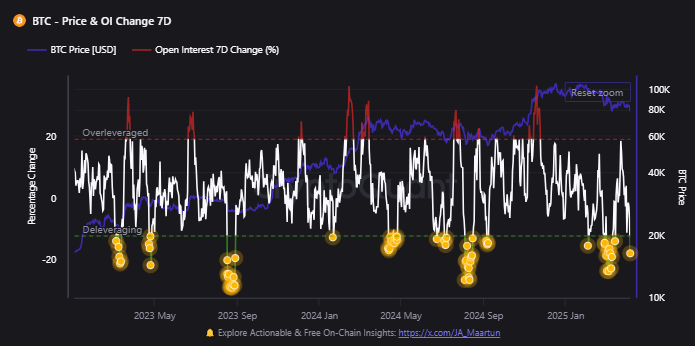Global economic tremors caused by escalating tariff tensions between the U.S. and EU have spilled into the cryptocurrency space, triggering capital outflows from Bitcoin ETFs and dampening investor sentiment. Meanwhile, a notable decrease in Bitcoin open interest has raised questions about future price action, while political innovation in Sweden has brought fresh optimism with a proposal to include Bitcoin in foreign reserves. These developments showcase a market grappling with volatility, uncertainty, and potential structural shifts that could redefine how digital assets are perceived at the institutional and national level.
European Union Moves Ahead with Retaliatory Tariffs Against U.S.
The European Union has officially endorsed a sweeping set of retaliatory tariffs against the United States in response to the Trump administration’s steel and aluminum levies. With more than $23 billion in American goods now subject to additional duties, this development signals the most aggressive stance the EU has taken in its ongoing trade tensions with the U.S. Products like soybeans, textiles, motorcycles, and even ice cream will be hit in a phased rollout of tariffs starting in mid-April. European officials have stated they prefer a diplomatic resolution but are united in the need to defend their economic sovereignty.
This latest salvo in the trade war amplifies uncertainty across global markets and highlights the growing rift between the U.S. and its traditional allies. The EU’s move is strategic, targeting key American exports that will likely trigger political pushback within the U.S. itself. As global trade flows become more constrained, multinational corporations and investment portfolios could face higher costs and logistical disruptions. With elections on the horizon in both Europe and the U.S., this tit-for-tat could escalate unless significant diplomatic progress is made.
Market Impact: Traditional equities and forex markets reacted with a noticeable dip in sentiment. While crypto isn’t directly affected by tariffs, the broader market fear has spilled into digital assets, reducing risk appetite and increasing volatility. Investors may shift towards safe-haven assets like gold or stablecoins in the short term.
Investors Pull $326 Million from Bitcoin ETFs Amid Tariff Angst
Bitcoin ETFs have seen a significant outflow of $326 million, a direct consequence of mounting fears stemming from the tariff conflict between the U.S. and the EU. Institutional investors, in particular, are moving away from riskier assets such as cryptocurrencies, choosing instead to sit on the sidelines while waiting for the trade environment to stabilize. This wave of capital flight suggests waning confidence in the short-term resilience of Bitcoin as a portfolio hedge during global uncertainty.
The move is notable because ETFs serve as a key vehicle for regulated institutional exposure to crypto markets. The scale of the withdrawal reveals not only concerns about tariffs but also broader worries about a potential global slowdown. Investors appear to be repositioning portfolios, reducing exposure to volatile sectors and opting for more defensive plays. Such outflows also limit bullish momentum for Bitcoin, which relies heavily on institutional participation for major price rallies.
Market Impact: This exodus from ETFs has directly affected Bitcoin’s price stability and sent a negative signal to the broader market. It has compounded recent bearish pressures and added to overall sell-side volume. Unless confidence returns or the macro backdrop improves, more outflows could be on the horizon.
Bitcoin Open Interest Has Dramatically Decreased; Historical Patterns Indicate Potential Outcomes
A sharp decrease in Bitcoin open interest is grabbing the attention of analysts and traders alike. Open interest—essentially the total number of active futures and options contracts—has historically served as a leading indicator of major market movements. When open interest falls dramatically, it often signals waning investor participation or the unwinding of positions, typically followed by increased price volatility. In this case, the drop appears to coincide with broader macroeconomic uncertainty and recent ETF outflows.
From a technical analysis standpoint, this reduction may indicate a near-term consolidation or a buildup to a more pronounced move, either upward or downward. Historical parallels suggest that such drops have preceded both relief rallies and further declines, depending on the state of other metrics like funding rates and spot market volume. As the crypto market currently lacks strong bullish catalysts, some analysts are cautioning traders to prepare for downside risk while others remain optimistic about a potential bounce.
Market Impact: This decline in open interest reduces market liquidity and increases the likelihood of price swings. It also weakens confidence among leverage-based traders. If the broader environment doesn’t stabilize, Bitcoin could see increased short-term volatility driven by lower depth and participation.
Swedish MP Proposes Bitcoin Inclusion in Foreign Reserves
A bold proposal from a Swedish Member of Parliament has sparked debate by suggesting that Bitcoin be included in Sweden’s foreign reserves. The MP argues that such a move would not only modernize Sweden’s financial infrastructure but also help diversify reserve assets beyond traditional holdings like gold and foreign currencies. The suggestion comes at a time when more countries are exploring ways to integrate digital assets into national financial strategies.
This proposal reflects a growing awareness of Bitcoin’s potential as a store of value and hedge against inflation, especially in the face of rising geopolitical tensions and fiat currency volatility. While Sweden is unlikely to make immediate changes, the proposal alone signals a shift in perception, especially in traditionally conservative financial circles. If such discussions continue gaining momentum, we could see similar policy considerations in other European nations as well.
Market Impact: Although not yet policy, this kind of political support can bolster long-term confidence in Bitcoin. It adds legitimacy and could influence long-term holders or institutions contemplating Bitcoin’s role in macro asset allocation. Positive sentiment could slowly build if more policymakers join the dialogue.
European Stock Markets Experience Significant Decline
European stock indices have suffered major losses in one of their worst trading sessions since the 2020 pandemic. The STOXX Europe 600 Index fell by 5.72%, with national markets like Germany’s DAX and France’s CAC 40 also taking heavy hits. This sell-off is attributed to escalating trade tensions between the U.S. and EU, which have unnerved investors and raised concerns about the potential for a broader economic downturn.
The widespread market slump has triggered a risk-off sentiment across global financial markets. Investors are pulling back from equities and rotating into safer assets amid fears of a recession, trade fragmentation, and prolonged geopolitical instability. European corporates with heavy export exposure to the U.S. are particularly vulnerable, which only adds to the bearish mood. The ripple effect is also being felt in emerging markets and commodity prices.
Market Impact: Crypto assets are indirectly affected as risk-off sentiment grows. Institutional investors tend to liquidate more volatile positions first—such as crypto—during times of broader market stress. This helps explain concurrent dips in Bitcoin price and ETF demand. Risk-averse behavior is likely to continue in the near term.
Key Takeaways
-
🟥 EU Imposes Retaliatory Tariffs: The European Union has enacted over $23 billion in tariffs targeting U.S. goods, escalating the trade war and creating market-wide uncertainty.
-
🟥 $326M Exits Bitcoin ETFs: Amid global economic fears, institutional investors are pulling money out of Bitcoin ETFs, indicating declining risk appetite.
-
🟥 Bitcoin Open Interest Plummets: A dramatic drop in Bitcoin open interest hints at an upcoming volatile price move and signals lower trader participation.
-
🟢 Swedish MP Pushes for Bitcoin in Reserves: A forward-thinking Swedish lawmaker has proposed integrating Bitcoin into national foreign reserves, signaling potential mainstream adoption.
-
🟥 European Stock Markets Tumble: Major European indices posted their worst losses since 2020 due to trade war fears, influencing crypto investors’ cautious stance.







